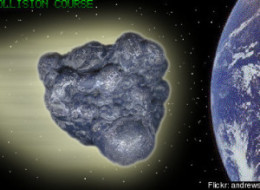
BERLIN — Countries around the world must team up to help prevent an asteroid, or giant speeding rock, from slamming into Earth, scientists and former astronauts said Friday.
NASA has tracked nearly 7,000 near-Earth objects that are bigger than several feet across. Of those, 1,157 are considered "potentially hazardous asteroids."
"We can't escape the conclusion that one could happen tomorrow," former NASA astronaut Thomas D. Jones said of a possible asteroid strike. "If it happens in the wrong place, it can be deadly. But we now have the technology to prevent them from happening."
To the experts, risky asteroids are those that come within 4.6 million miles of Earth's orbit. NASA says that currently none of these is near enough or big enough for public concern.
Jones spoke at the European Space Agency's operational center in Darmstadt, Germany, where former NASA astronauts and scientists from space agencies across the globe pushed for international space agencies to band together to address the issue from within the U.N.
Jones and his colleagues proposed that a group involving the world's space agencies be established to pool resources to prevent such an asteroid's impact and to better inform the public of the possible threat.
Russell Schweickart, a former Apollo 9 astronaut, compared the asteroid threat to that of space debris hitting the International Space Station, which he said is "small enough that we can move it out of the way."
The technology exists that would effectively allow scientists to send a craft into space to rear-end an asteroid, and slightly change its velocity.
"We can't move the Earth, (so) we have to go up and change the orbit of the asteroid," Schweickart said. "It's the same problem, all relative motion, but it's a massive undertaking."
Story continues below
Advertisement
So far, NASA is the only space agency that spends any substantial funds on asteroid research, $4 million a year, but follow-up research also is conducted by other space agencies. Any attempt to intercept an asteroid would require the approval of many nations.
"It threatens all parts of the planet, so the solution involves crossing international borders," Jones said.
___
Science Writer Seth Borenstein contributed to this report from Washington.
___
Online:
NASA's Near Earth Object program: http://bit.ly/90IYeT













0 yorum:
Post a Comment